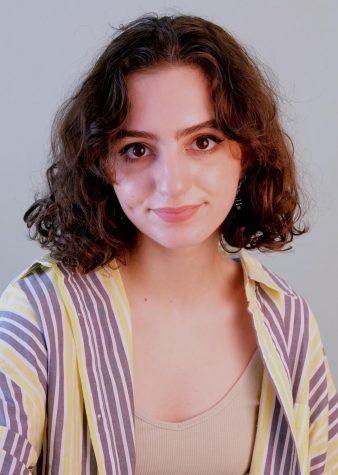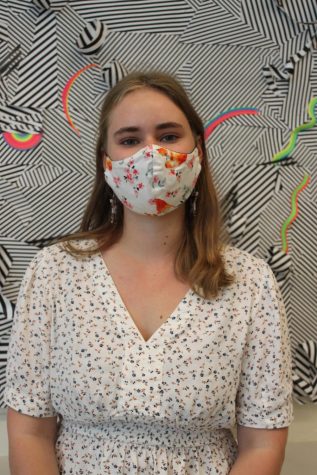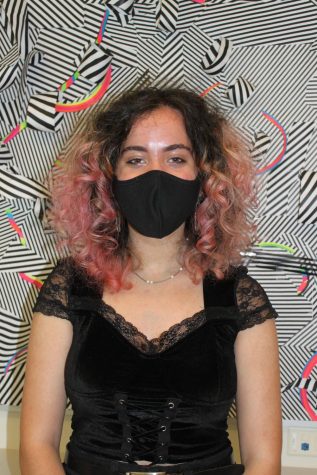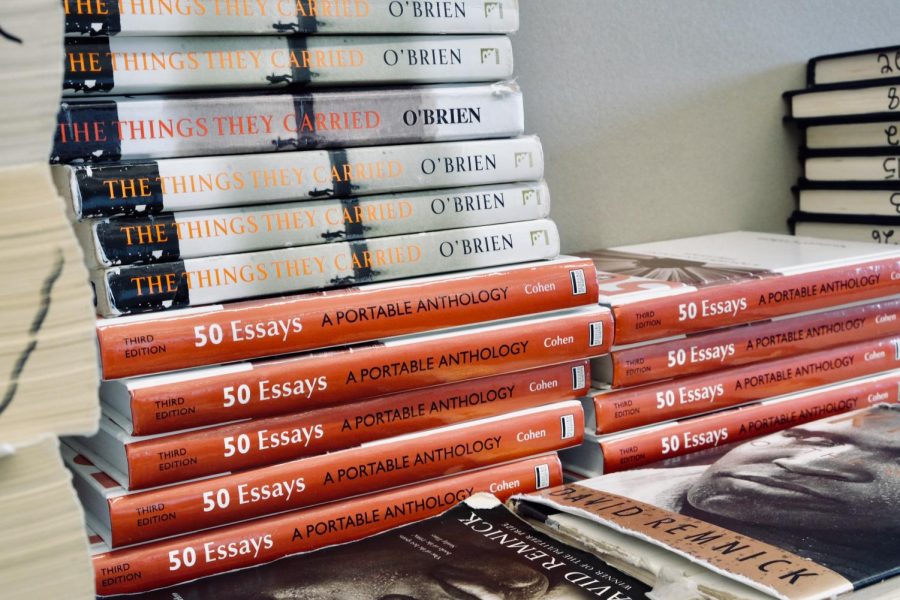English Department 2.0
Photo courtesy of Iris Tsouris.
AP Lang reading material in English teacher James Demer’s room.
Back to the Course Catalog here.
AP Lang
The AP course that replaces American Literature for juniors, AP Language and Composition is a college-level class that focuses on rhetorical analysis, meaning the reading list tends to gravitate towards nonfiction works. Students that choose to take this class will find themselves writing analytical essays on not what, but how authors write and what words or figurative language is used to convey their ideas. AP Lang is taught by different teachers from year to year, in the past including Zachary Welser, but almost always taught by James Demer.
Demer’s version of AP Lang primarily draws reading material from 50 Essays: A Portable Anthology, which includes personal essays from Dr. Martin Luther King Jr., James Baldwin, George Orwell and more. Aside from this, he teaches various books, such as King of the World: Muhammad Ali and the Rise of an American Hero and Maus, a graphic novel about the Holocaust.
To stimulate critical thinking, Demer’s class is very discussion-oriented. These discussions, while thorough, are quite casual, making it easier for students to participate and contributing to the laid-back environment of the class. Students can get a feel for his class’s environment from Demer’s YouTube channel, where he periodically uploads highlights from his AP Lang classes.
“It’s got a very relaxed vibe. […] The best part is Mr. Demer himself, just the way that he’s so open. It’s a very conversational class, and it feels a lot less strict than a lot of core classes I’ve taken in the past,” said Sam Grant (‘21). “It’s not really geared towards preparing you directly for the AP exam, but it’s more focused on making you a better writer as a whole.”
A unique aspect of Demer’s class is his focus on college preparation. He almost always assigns a project meant to guide his students through writing their own college essay ahead of time, giving them a head start on senior year college applications.
Although this is an AP class, it is by no means difficult to get an A in. Coupled with a very reasonable course load, Demer’s students report that he gives them ample time in class to complete assignments and essays.
AP Lit
AP Literature and Composition is another college-level English course. Instead of AP Lang’s rhetorical analysis, AP Lit focuses on literary analysis: while rhetoric focuses more on an author’s approach to communicating a subject, literary analysis handles the plot and themes of a story, meaning the reading material is more fiction-based. Taught by teacher Kimberley Nesbitt, this course is typically taken during students’ senior year.
One important aspect to note about AP Lit is that most colleges have it under the same college credit as AP Lang, meaning getting a 4 or 5 on the AP Lang exam eliminates the need to take AP Lit (and vice versa). Despite this, AP Lit’s reputation at Chamblee has some seniors coming back for more, even after passing the AP Lang exam.
“It’s one of my favorite classes,” said Francesca Mariano (‘22). “I find I’ve been able to learn the most in that class, and I’ve gotten better at a lot of the same skills that we’ve been learning since middle school, but you really get to expand on them.
The class encompasses a wide variety of material. Each type of literature is a different unit, so if a student has trouble analyzing poems for example, they won’t have to discuss it for long. The inverse is also true, but many students find that the units don’t drag on. Most of their time is spent discussing the texts.
“We read poems, we read short stories, we read books, we read plays,” said Ryan Donovan (‘22). “We do discussions, questions. So it’s just basically an in-depth literature class where you’re not just reading it and being quizzed on the content. You’re being quizzed on the meaning, the themes.”
“I would say the whole class is about analyzing literature,” said Mariano. “You do a lot of reading, [and] a lot of it is discussion based. Whenever we have a play or book that we’re reading, we have a Socratic seminar about twice or three times a week. So if you’re not interested in really getting to the nitty-gritty of things or really just taking the time to discuss, I wouldn’t totally recommend it.”
The homework is light with a lot of the assignments being completed in class in the form of journal entries, class discussions, and reading. Nevertheless, most of the time both in and out of class is spent interpreting fiction.
“I would recommend this class to any people who are interested in English,” said Tanzila Jamal (‘22). “[…] It’s not really for you if you don’t enjoy reading because it’s really in-depth.”
“[It’s] definitely a senior class,” said Mariano. “I would recommend it if you’re kind of good at self-discipline with your work and if you really enjoy diving deep into concepts.”
Seniors enter AP Lit with three years of high-school English under their belt, making them well-prepared for the experience. Furthermore, classes are discussion-oriented, with plenty of opportunities for enrichment and personal growth for students.
Multicultural Lit
Multicultural Lit is a non AP level course taken by seniors instead of Brit Lit or AP Lit. The course is focused on reading fiction from a wide variety of races, ethnic backgrounds, classes, genders, and orientations. The pace is slower than AP Lit due to its non AP status, which gives students more time to understand and absorb the content. A central aspect of the class is the group discussions.
“We need to hear each other’s voices, you can learn a great deal from each other,” said teacher Adrienne Keathley. “I help provide a safe space for you to speak your mind and in return you help me to make room safe for others as well.”
The course work is relatively light, but students say Keathley is strict on grading. Homework grades take up a substantial portion of the final average, so students must consistently complete their assignments both well and on time.
“It’s not that heavy, since in eleventh grade I was an AP Lang,” said Rudraksha Bhukhanwala (‘22). “It’s not as stressful in terms of the homework. There’s like 10 Page reading and eight discussion questions. So about forty five minutes to an hour worth of work per day, but you can get it done in class.”
“Usually we read chapters from a book and do a reading guide on it and then we discuss […],” said Phinn Adams (‘22). “It’s pretty discussion based, but our final project […] was writing an essay. You have one or two essays a semester, but it’s not a lot to write, except for the reading guides, which she wants in depth answers for.”
The class is designed to expose students to points of view and social issues they may have never experienced before.
“I think if you’re signing up you should be open to being uncomfortable in certain situations,” said Bhukhanwala. “When I read the text, I was thrust into these new perspectives, which I didn’t really know about, and I think that’s a good thing. Being uncomfortable is a good thing, because I’m learning so much about the Black American culture, which I didn’t know prior to this class. I’m very grateful for taking it. It’s gotten me outside my comfort zone, which I really am enjoying.”
Brit Lit
Brit Lit is taught by two teachers: Zachary Welser (Gifted) and Hannah Postema. It is an alternative to AP Lit similar to Multicultural Lit. The reading is mostly written by white English men, but Welser tries to take a more philosophical approach in order to make the material more accessible.
“In terms of how it differs from AP Lit or Multicultural Lit, I know multicultural Lit the entire purpose is to read texts from non white authors, so if that’s something that appeals to students that’s the route for them,” said Welser. “If students like philosophical conversations and how the human experience can basically be applied universally, basically, no one’s special we’ve all suffered, then Brit Lit is a good option. In terms of how it compares with AP, I don’t like poetry and I don’t want to do that much of it.”
The class consists of reading checks, quizzes, group discussions, and a final project. Many students dislike the reading checks, but they are less impactful than the other categories on student’s averages because they make up less than 5 percent of the grade. The quizzes and class discussion are on the selected text, so if the material is read these sections can be scored well on. There are a lot of projects and the final project is usually writing a paper.
“There were a lot of reading checks first semester,” said Adam Brock (‘22). “But besides that, we’ve had three projects essentially, and they’ve all been smaller. And, like, one, two tests. Welser is not big on assessments.”
Welser is generally lenient and understanding when it comes to late work. “Honestly he has never been annoyed if you turn them in a day late,” said Brock.
Many students enter the class unaware of the realities of reading older literature, but enjoy Welser’s teaching style and personality.
“I wish I would have known how hard it is to read old English literature and I don’t really know what I would recommend to them,” said Joseph Trent (‘22). “Not the biggest fan of lit classes in the first place.”
“Mr. Welser is great, in my opinion,” said Trent. “Being a younger teacher, I feel like he can relate more to how the students feel about the work.
Writer’s Workshop
The elective for aspiring authors, Writer’s Workshop is a class where students can hone, develop and eventually perfect their writing skills. Taught by Chamblee’s English teachers, this elective—while heavy on writing—combines a peaceful, work-at-your-own-pace environment with intense creative stimulation.
The curriculum for Writer’s Workshop primarily focuses on creative writing, such as short stories. In rare cases, it does delve into nonfiction scholarly writing, particularly persuasive essays. Students also periodically dabble in poetry, while exploring different techniques, such as writing dialogue and developing fantasy settings.
In terms of grades, students in Writer’s Workshop describe the class as an “easy A,” with a relatively light and flexible course load. That said, students typically write around one page per day.
According to its participants, the class’s environment is akin to that of a peaceful coffee shop. Students are free to listen to music while typing away at a short story or essay. Often, daily assignments are prompt-based, and on Fridays, students participate in Free-Write Fridays, where they have the option to write whatever they please. The student writers also often submit content to Chamblee’s literary magazine.
“The best part of the class has got to be all the creativity and freedom of expression that you have,” said Cooper Lund (‘21). “If you feel like you don’t have any classes to create in, then Writer’s Workshop is definitely something to work into [your schedule].”
AP Seminar
Chamblee High School introduced the AP Capstone program to Chamblee in 2018. The first of the two — AP Seminar — introduces students, usually sophomores or juniors — to the college-prep approach of research and presentations. Although it is coded as an ELA class, it is an elective and students do not take AP Seminar in lieu of a core ELA class.
“AP Seminar is a pretty rigorous class that focuses on analyzing and synthesizing information,” said Stella Garrett (‘21). “It’s a lot of research and writing, but with the help of [the teacher] you’re able to figure out effective ways of gathering info and reformatting it into essays.”
Garrett says she definitely found the class interesting with the special AP Capstone diploma seal and the prospect of college applications in mind.
“Seminar was enticing to me because the pathway sounded really impressive and it seemed like it would help with college as well as writing in general,” said Garrett. “I would recommend this class, but definitely not to everyone. In order to succeed in AP Seminar you need to be self-motivated, comfortable with presenting, and a strong writer.”
The class has a definite atmosphere of productivity and community as all the students work towards their final projects.
“I would recommend [the class] because it gives you a lot of freedom about the topics you choose to study,” said Amina Lomini (’21).
“And it gives you a chance to talk about your own interests,” added Anika Karim (’21).
“The worst part is definitely how harsh some of the deadlines are,” said Garrett. “Things can easily pile up if you aren’t mindful. The course load is pretty heavy, especially if you aren’t able to keep yourself organized.”
As far as the coveted AP “A” so many Chamblee students so highly regard, Garrett says the grade truly will be justified by the work put into the class.
“I think that it’s definitely possible to get an A in AP Seminar, but I wouldn’t expect it off the bat,” said Garrett. “This class definitely isn’t for everyone, but if you do the work and you try to improve as the semester moves along, your grades should reflect your effort.”
AP Research
The next class in the AP Capstone pathway is known as AP Research, an independent project-based class made for the unique and passionate learners that want to study what they can about the world around them before making their way into the world as college students. Nate Kite (‘21) reflects on the class’s approach as he finishes his third semester as a Capstone student.
“The idea behind AP Research is that you perform some kind of research project – that nobody’s done before – and essentially publish a paper on the subject,” said Kite. “This should be new research – by the time you’re done with your paper, you should be the foremost expert in your very specific niche where your paper is. And you get total control over your topic — you can do anything from music to bacteria growth.”
A seasoned researcher from his year in AP Seminar, Kite values the complete control you get over your project.
“It’s a really interesting and unique class and unlike most other classes, you have total control in what you research,” said Kite. “Seminar is less interesting to me personally but it’s still useful and I do think it’s worth taking to be able to take research.”
Sahara Hetherington (‘20) mirrors appreciation for the liberty in creating your own path in the class and sees the application of this class in her future.
“You do a lot of research in college so I think being exposed to it early on will help me because at least I kind of have some footing in what I am going to be doing,” said Hetherington. “It’s really interesting because you get to pick what you wanna do so it’s not like you’re just spending a year doing something you don’t value.”
Hetherington explains that the class is for a very specific type of student.
“It’s a very independent class, you have to be really on top of what you’re doing because you can get behind really easily,” said Hetherington. “You have to be self-motivated, organized and have some sort of idea of what you want to research because it’s a year-long research-dedicated class. It’s basically like a science fair but it doesn’t have to be a science experiment, it can be whatever you want.”
Kite agrees the class can be difficult at times.
“I think the class is generally pretty manageable, though it can get pretty crunchy close to big deadlines,” said Kite. “I think there’s normally enough class time to get things done in class so it normally won’t add too much homework and every once in a while you get a week where you don’t really have anything to do so those turn into your free time.”
Shrika Madivanan (‘20) says the class gives her more than any other class, and thanks the structure and purpose of the class for her involvement and achievement.
“Most classes in school you don’t have the opportunity to do something you actually care about,” said Madivanan. “But with Research and Seminar […] what you do is something you are passionate about and spend the entire time focusing on that topic.”
Read about the AP Capstone program here: Recapping AP Capstone. Was it worth it?
Journalism: Newspaper
The perfect class for students interested in the world around them as well as uncovering the truth behind how Chamblee High School functions is none other than Fred Avett’s journalism class: the people behind the Blue & Gold newspaper. What the paper partakes in is much more than just interviews, however. The class consists of around twenty handpicked students each year that become a community of class discussion and, as James Hardy (‘21) puts it, lots of “writing” and “words.”
“We write articles about what’s going on around the school, about what students are achieving, and things happening in DeKalb County,” said Keegan Brooks (‘22). “And we work to better our writing skills.” He nods to Hardy.
The class may be a team effort, but many specific roles and jobs keep members hardworking and independent. Staff writers work in pods under editors who scan their articles for errors and help with whatever they can in the writing process.
“I’m a second-year staff writer […] and I spend a lot of time interviewing alumni,” Catherine Cossaboom (‘21) said. “I’ve always liked writing and I thought this would be a cool opportunity to have fun and get published because it’s kinda cool to be published.”
The class has students in 10th, 11th, and 12th grades as part of the staff, each with their own perspectives and experiences to bring to the table.
“As a junior, I have more experience in the school so I know where to go to find the information and what teachers to ask — who teaches what and who deals with what — so it’s easier to get the information you need to write,” said Hardy. “I really enjoyed writing about our rivalry game this year and definitely alumni pieces are fun because we always have a ton of people that go out from Chamblee and do amazing things.”
What makes this class so special to students like Cossaboom and Brooks is its uniqueness. Students must learn an entirely new approach to writing and get out of their comfort zone with classroom “scuttlebutt” discussions and interviewing processes.
“I feel like in a lot of classes we will read and analyze writing but when we do our own writing it’s mainly if not completely persuasive writing or just essays, and I feel like [this class] gives you a break from that,” said Hardy. “You learn to write as objectively as possible but also write a good opinion piece that doesn’t feel [as] formulaic like a five-paragraph essay.”
As well as writing articles in a week-long cycle, at the end of each month students are required to write an opinion piece — an op-ed — to share their views on different aspects of their lives, be it the Impeachment proceedings or some sushi they had last week.
“For op-eds, I just think it’s really fun to have a platform to write about anything you want,” said Cossaboom. “Sometimes at the end of the month I just need to rant about something and that’s a great way to do it.”
The class meets every day and communicates through GroupMe and email to keep working on their ever-multiplying stories and projects. However, editor Foster Cowan (‘20) finds time to edit his pod’s articles and provide guidance mostly during the school day.
“We’re during fourth period so we have the most time out of the school day to work on journalism and I’ve found that if you devote at least [two lunch periods] to your work for the class you won’t have to do much at home,” Cowan said. “If you manage your time correctly it’s a very light workload.”
Cowan looks back on his years with the newspaper and finds it extremely helpful not only with coming out of his shell but also with his connection to the Chamblee community.
“What I’ve found with journalism is that it’s connected me to the school a lot so I’m way more in tune to school issues, I’m way more observant, I’m always looking for small things I could cover […] and also through interviews over my three years I’ve interviewed a ton of teachers and students and parents and even people outside of the school,” said Cowan. “I feel like that has not only given me skills but has also brought me closer to the community of Chamblee — having to talk to people you wouldn’t normally talk to.”
Be it the hilarious class time shenanigans with Avett or the interesting and invigorating article process, Cowan is grateful to have spent the last three years with the Blue & Gold staff.
“I feel like as a writer and a person I would not have been the same if I wasn’t in journalism.”
Journalism: Yearbook
If you’ve ever wondered how the massive book holding your entire school year’s worth of memories got from the minds of students into your hands in May, look no further. The “Chamhian” is the love and labor of the Chamblee High yearbook staff, a journalism class that meets in fourth period with Jennifer Andriano as their ringleader and senior Brian Roberts as their editor-in-chief, who feels a strong connection to the people she works with.
At the time of these interviews, the class was led by the now-retired Amy Branca and then editor-in-chief Hattie Carter.
“I don’t wanna be cheesy but I really love these people and I like being able to work with them, so even just walking in is a good time,” Carter said. “I’m never too stressed even if I have stuff to do because we make it fun. I enjoy the things I’ve learned like time management and just being able to keep up with everyone’s stuff on top of my own is not as easy as it sounds.”
The class’s main goal — the publication of the yearbook — takes a whole team of editors and writers to get the job done.
“We are running a mini-business. We have a product that we’re selling, which is obviously the yearbook. We have deadlines, we have different roles, and it’s like a well-oiled machine,” said editor India Hetherington (‘20). “And when you think stuff is hitting the fan, you just gotta work it out because at the end of the year, we need the book and we have to meet our deadlines, and you just have to keep going.”
Becoming a part of the yearbook is in part a choice you make and also a choice the people around you — like staff members and teachers — make for you.
“For yearbook, I was nominated by a teacher but if other kids in the class know you, you can be nominated through them,” said Hetherington. “But the reason I joined the staff was that it was like a mini-family […] and I always knew I wanted to do it. When I was invited I was like, ‘I finally have the chance to do something creative at school that I enjoy.’”
Other students, such as Morgan Warfield (‘21), value the class “family” and work on other aspects of the production.
“It’s my first year here and I’m just a staffer [sic] so I’m not really in charge of anything but my role is to go and interview people and write the captions and take pictures for the spread, which is what we call the pages of the book,” said Warfield. “The best part about this class is that it’s got a great sense of community and we’re all really close.”
Hetherington warns that it isn’t for everyone and isn’t always bright and rosy, but that so much can be gained from the experience.
“I’m a high-stress individual and there are times I cry because of yearbook things when I shouldn’t,” said Hetherington. “It’s really good as basically an internship so if you want that experience before college or want graphic design experience it’s good, but I definitely had to learn how to manage myself better and that [ended up being] a plus for me.”
Read more about the class here: A snapshot on Yearbook. How Chamblee’s yearly memento is made.
SAT Prep
*Note: This class is listed on the counseling class sheets but may not exist anymore or be actually offered next year*
For those caught in the throes of College Board testing, the SAT Prep elective allows students to skip the inconvenience and cost of an independently-taught SAT Prep course and take one through the school. Usually, the class is taught by a math or English teacher each semester, switching classes in-between.
While SAT Prep encompasses content found on the actual SAT, the class is also designed to familiarize students with the test format itself. Typically, this involves taking timed practice tests from the College Board Official SAT Study Guide, which helps to build student confidence prior to test day.
“Anybody that has extra time in their schedule and wants to improve their [SAT] score will definitely succeed,” said Kara Dole (‘21).
And, according to students, taking SAT Prep truly does yield desirable results.
“When I took the PSAT [this year], my score went up 200 points from the original score that I had [last year],” said SAT Prep student Saray Gonzales (‘21). “A lot of the questions on the PSAT were really similar to the stuff we were doing in class.”
Your donation will support the student journalists of Chamblee High School Blue & Gold. Your contribution will allow us to print editions of our work and cover our annual website hosting costs. Currently, we are working to fund a Halloween satire edition.

Iris Tsouris is a senior and editor-in-chief of the Blue & Gold. Outside of the paper, you can find her giving out haircuts, designing T-shirts, and sampling fruit at the Buford Highway Farmers Market. In five years, she hopes to be caring for a herd of cattle while making art in an obscure Swiss village. This is her third year on the staff.

Sirianna Blanck is a senior and editor-in-chief of the Blue & Gold. She has a strong cat obsession. In five years, she hopes to be fighting for environmental change. Her Chamblee experience has been akin to "Alice’s Adventures in Wonderland."

Sydney Leahy is a senior and editor on the Blue & Gold. The movie that best encapuslates her high school experience is "Panic Room" by David Fincher. In five years, she hopes to have earned the title of reclusive curmudgeon, living on in fables told by cowering neighborhood children. This is her second year on the staff.






